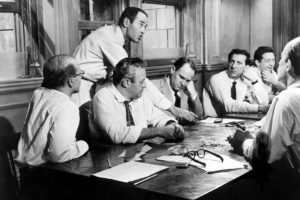
A scene from the 1957 version of ‘12 Angry Men’: From left, John Fiedler, Lee J. Cobb, Henry Fonda, E.G. Marshall, Jack Klugman, Edward Binns and George Voskovec. PHOTO: EVERETT COLLECTION
On jury duty this month, I’ve had plenty of time to reflect on the meaning of the 1957 film “12 Angry Men.” Law schools still use the 60-year-old courtroom drama about a biased and easily swayed jury as a teaching tool. The question remains: Does the movie prove or disprove Mark Twain’s characterization of trial by jury as “the most ingenious and infallible agency for defeating justice that human wisdom could contrive”?
Jurors are all too human, something the ancient Greeks tried to mitigate by allowing some jury panels to have 1,000 or more citizens at a time. To prevent malicious plots and ensure a broad mix of people, every juror received half a drachma a day—enough to feed a poor man and his family. But such precautions failed to save Socrates from his enemies in 399 B.C. An Athenian jury, egged on by an anti-Socrates faction, convicted him of “impiety” and “moral corruption of the young” by a majority of 280-221. Continue reading…






